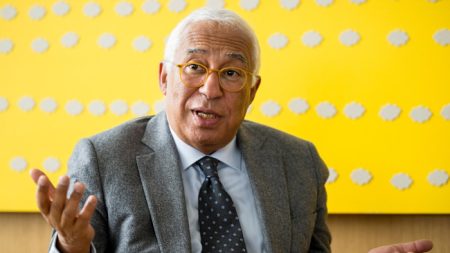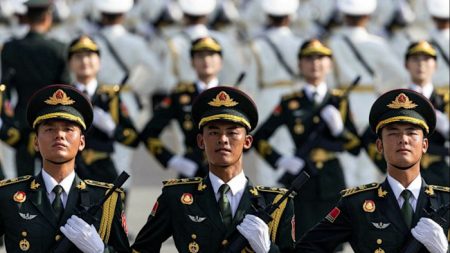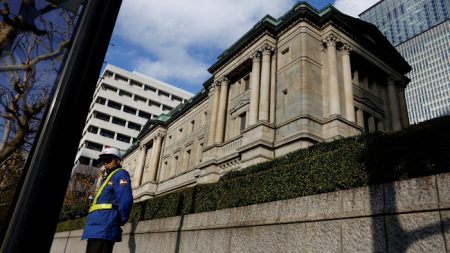Three white-suited BMX riders embraced and screamed after crossing the finish line split seconds apart to sweep the gold, silver and bronze medals in the same event — a joyous achievement for the host nation of France.
“We had a magical moment, all together, with the French public and we managed to do something exceptional,” said the gold winner Joris Daudet, celebrating success alongside his two friends and fellow BMX bikers, Sylvain André and Romain Mahieu.
Driven by the desire to win in front of a home crowd, France snagged 64 medals, including 16 golds, during the Games that ended on Sunday with a closing ceremony scheduled for 9pm local time.
That more than doubled its tally of 30 in Tokyo 2020, and was better than the 42 it achieved at Rio 2016; the 32 at London 2012; and the 43 at Beijing 2008, France’s previous highest total in the modern Olympics era.
France finished in fourth place in terms of overall medals and fifth place when weighted for golds, just ahead of the Netherlands and Great Britain on that measure. The results met the ambitious goal set by President Emmanuel Macron to push France back into the top five after decades of languishing near the bottom of the top 10.
France’s outperformance is typical of host nations, which benefit not only from home advantage, but also from intensified training and bigger budgets before the competition. In one of the most successful campaigns, the UK boosted training budgets for a decade ahead of London 2012, resulting in a surge in the medal table to third, behind traditional powerhouses the US and China.
France also overhauled the way it manages its top athletes by adopting a top-down, national approach inspired by the UK. The new Agence Nationale du Sport was created and funded with an extra €110mn on top of the usual state funding so as to centralise expertise on everything from nutrition to data analytics.
Founded in 2019, the ANS is led by Claude Onesta, a gruff and accomplished former handball coach. Onesta directed extra money to federations with the greatest medal potential and then held them accountable for athletes’ results. The move was contentious in France, though Onesta did not dare go as far as the UK, which cuts off cash altogether to weaker sports.
The approach has paid off. Onesta described the Games as “an exceptional achievement” for French athletes. “When we imagined doubling the number of medals in three years from Tokyo, it seemed impossible, but here we are,” he said.
Athletes in sports traditionally strong for France, such as fencing, judo and cycling, did well. The 22-year-old swimmer Léon Marchand became the breakout star in Paris by winning four gold medals, an unprecedented feat for a French athlete at a single Olympics.
Teddy Riner, an experienced judoka and fan favourite, prevailed yet again in his fifth Olympics to win the individual gold in his category and then lead the judo team to gold.
Team sports, including men’s rugby sevens and volleyball, also delivered gold, while men’s football earned silver after the team lost to Spain in the final. The men’s basketball team also won silver on Saturday, but was outclassed by a US team filled with NBA stars such as Stephen Curry, whose run of three-pointers in the closing minutes left French rookie star Victor Wembanyama in tears after the buzzer.
Some French athletes appeared to crack under the pressure of competing before raucous home crowds. Two women judoka, who were targeting gold medals, won bronze instead, while a promising French pole jumper fell short in early rounds.
“Some suffered under the heavy expectations,” said Onesta at a press conference on Sunday. Fifteen finals were lost, leaving the athletes with silver instead of gold, a lower conversion rate than other big sporting nations, he added.

The US and China stood atop the weighted rankings with 40 gold medals each, followed by Japan and Australia.
Coming home with 90 medals total, China shone brightest in the pool where it won 12 medals, including gold and a world record for Pan Zhanle in the men’s 100-metre freestyle. It also racked up 11 medals in diving and 10 in shooting.
The Americans won 126 medals, driven by an exceptional showing in athletics, with 34 medals overall and 14 golds, including those won by sprinters Noah Lyles, Gabby Thomas and the women’s dominant 4 x 100 metre relay team. The US swimming team collected 28 medals, albeit just eight golds.
Team GB has won 65 medals and 14 golds, including three in rowing and two in cycling, typically strong disciplines.

Despite scepticism ahead of the Olympics, as well as security and logistics concerns, French fans were converted to fervent enthusiasm as soon as the rain-soaked opening ceremony on the river Seine began.
“At the beginning we were quite anxious about the Games in Paris,” said Géraud Taurand, an engineer living in the capital. “But it’s amazing, we are seeing a beautiful Games, the athletes are really incredible and [every time] we win a medal it’s like, ‘Oh yeah we are still in the top podium of all the countries around the world.’”
Vincent Petit, a Toulouse resident visiting Paris for the Games, said: “No one can beat the USA, so we are just aiming for some respect.”
Additional data visualisation by Janina Conboye and Cleve Jones
Read the full article here














